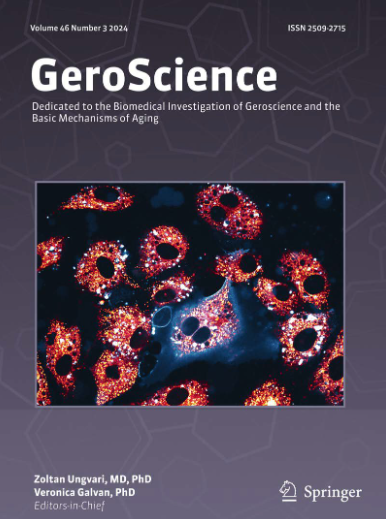认知障碍和阿尔茨海默病中转座因子的表观遗传失调。
IF 5.4
2区 医学
Q1 GERIATRICS & GERONTOLOGY
引用次数: 0
摘要
衰老和认知障碍会增加患阿尔茨海默病(AD)的风险,越来越多的证据表明,基因组中的转座因子(te)在衰老和AD中发挥作用。在这种情况下TE失调的机制尚不清楚,但一种可能性是表观遗传变化,包括DNA低甲基化和/或染色质结构减少,是年龄和ad相关TE活性的基础。因此,本研究的目的是为研究TE在衰老和AD中的表观遗传学提供资源,并利用它来确定表观遗传失调的TE是否与年龄/AD相关的临床结果相关。我们对45名健康老年人、轻度认知障碍(MCI)和AD痴呆患者的外周血样本进行了rna测序,我们观察到MCI和AD患者TE转录物的波动表达模式,与之前的报道相似。然后,我们使用全基因组亚硫酸盐测序(WGBS)和转座酶可及染色质测序(ATAC-seq)来表征同一受试者的整体DNA甲基化和染色质可及性。我们发现,在MCI和AD的RNA-seq数据中,大多数富集/失调的te可以在基因组的低甲基化和染色质可及区域中找到。这些te包括几个与人类炎症和疾病直接相关的te,它们与我们研究对象的认知/功能诊断、年龄和炎症和神经退行性变的生物标志物有关。总的来说,这些发现与表观遗传改变可能导致TE转录紊乱的观点是一致的,而TE转录紊乱在衰老、认知能力下降和AD中起着重要作用。本文章由计算机程序翻译,如有差异,请以英文原文为准。
Epigenetic dysregulation of transposable elements in cognitive impairment and Alzheimer's disease.
Aging and cognitive impairment increase the risk for Alzheimer's disease (AD), and growing evidence suggests that transposable elements (TEs) in the genome play a role in aging and AD. The mechanisms of TE dysregulation in this context are unclear, but one possibility is that epigenetic changes, including DNA hypomethylation and/or reduced chromatin structure, underlie age- and AD-related TE activity. Therefore, the purpose of the present study was to generate a resource for studying TE epigenetics in aging and AD, and to use it to determine if epigenetically dysregulated TEs are related to age/AD-relevant clinical outcomes. We performed RNA-seq on peripheral blood samples from 45 healthy older adults, mild cognitive impairment (MCI) and AD dementia patients, and we observed a pattern of undulating TE transcript expression with MCI and AD, similar to previous reports. We then used whole-genome bisulfite sequencing (WGBS) and transposase-accessible chromatin sequencing (ATAC-seq) to characterize global DNA methylation and chromatin accessibility in the same subjects. We found that most TEs that were enriched/dysregulated in our RNA-seq data with MCI and AD could be found within hypomethylated and chromatin-accessible regions of the genome. These TEs included several that have been directly linked to inflammation and disease in humans, and they were related to cognitive/functional diagnosis, age, and biomarkers of inflammation and neurodegeneration in the subjects we studied. Collectively, these findings are consistent with the idea that epigenetic alterations may contribute to TE transcript dysregulation that plays an important role in aging, cognitive decline, and AD.
求助全文
通过发布文献求助,成功后即可免费获取论文全文。
去求助
来源期刊

GeroScience
Medicine-Complementary and Alternative Medicine
CiteScore
10.50
自引率
5.40%
发文量
182
期刊介绍:
GeroScience is a bi-monthly, international, peer-reviewed journal that publishes articles related to research in the biology of aging and research on biomedical applications that impact aging. The scope of articles to be considered include evolutionary biology, biophysics, genetics, genomics, proteomics, molecular biology, cell biology, biochemistry, endocrinology, immunology, physiology, pharmacology, neuroscience, and psychology.
 求助内容:
求助内容: 应助结果提醒方式:
应助结果提醒方式:


